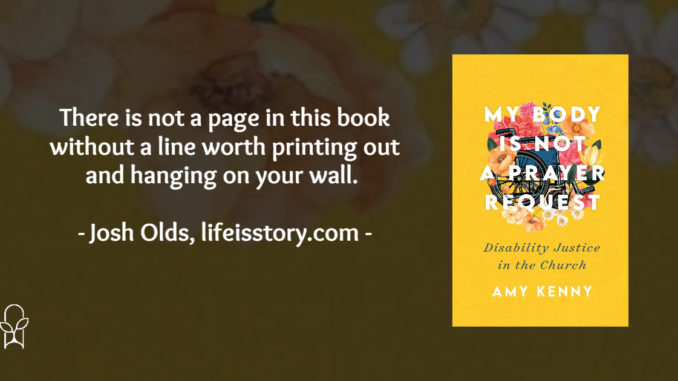
Also by this author: My Body Is Not a Prayer Request: Disability Justice in the Church
Published by Brazos Press on May 17, 2022
Genres: Non-Fiction, Christian Life
Buy on Amazon
Goodreads

The church has forgotten that we worship a disabled God whose wounds survived resurrection, says Amy Kenny. It is time for the church to start treating disabled people as full members of the body of Christ who have much more to offer than a miraculous cure narrative and to learn from their embodied experiences.
Written by a disabled Christian, this book shows that the church is missing out on the prophetic witness and blessing of disability. Kenny reflects on her experiences inside the church to expose unintentional ableism and cast a new vision for Christian communities to engage disability justice. She shows that until we cultivate church spaces where people with disabilities can fully belong, flourish, and lead, we are not valuing the diverse members of the body of Christ.
Offering a unique blend of personal storytelling, fresh and compelling writing, biblical exegesis, and practical application, this book invites readers to participate in disability justice and create a more inclusive community in church and parachurch spaces. Engaging content such as reflection questions and top-ten lists are included.
The goal of a book review is to offer readers an objective overview of a book’s contents and interact with some salient portions the reviewer thinks their audience will find interesting. I’ve written this review five different times trying to capture the prophetic weightiness of Dr. Amy Kenny’s words in My Body Is Not a Prayer Request. It begins with the title: bold, firm, and perhaps shocking to the able-bodied. In the book’s opening pages, Kenny recounts the time that a stranger told her “God told me to pray for you…God wants to heal you!” This is far from a one-time thing. I’ve been here before, she writes, It never ends well. She makes a decision: “I don’t need prayer for healing. My body has already been sanctified and redeemed.” The prayerfulness turns to bewilderment and anger. “If you stopped resisting, you would be free already.” Then, Kenny concludes: All I need to be liberated from is the notion that disability is inherently deviant and in need of eradication.
It’s a powerful, perhaps paradigm-shifting anecdote. It can be a bit rattling, discombobulating, because disability does not often fit the theology of victory that saturates the evangelical church. Just in the first few pages of My Body Is Not a Prayer Request, Amy Kenny drops lines like:
Theodicy runs through my veins.
They are too hyped up in their divine intervention to realize they are not the savior in my story.
This woman uses the prayer card to justify imposing her prejudice on a stranger she assumes despises being disabled.
I am many things, but a tragic defeat is not one of them.
Most days, my disability isn’t the worst part of my day, or even what I need prayer for.
She writes about how people in church often see her for what she is not—at least to them. She wishes she could be seen as more than her diagnosis, more than a problem in need of fixing, “as if my disability is only valuable if converted into a cure.” She writes about those who go to the other extreme and constantly question her disability in order to refuse making accommodations.
My disabled body is subjected to interrogation whenever I enter the public sphere.
I have the right to belong without being pitied. To dream big dreams that aren’t someone else’s inspiration porn.
I have the right to be human.
My Body is Not a Prayer Request is a personal manifesto, it’s a public declaration, it’s a prophetic call to the church and to society. Kenny reflects on the intentional and unintentional ableism, corrects the toxic theology that can’t bear disability (never mind they worship a God with nail-scarred hands), and counters the paternalism of the abled with a sharp wit and a no-nonsense approach. There is not a page in this book without a line worth printing out and hanging on your wall. Amy Kelly lays her soul bare, writing with such authenticity and vulnerability—all because she believes that in telling her story we can make our churches more like God’s Kingdom.
